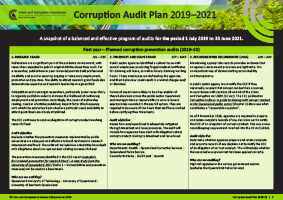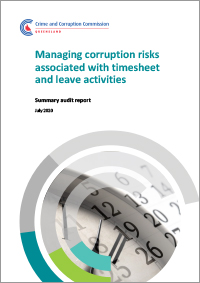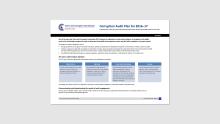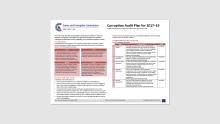The CCC conducts audits to examine how public sector agencies have responded to particular types of complaints about corruption and how robust their complaints management and prevention frameworks are. The audits are also aimed at controlling the risks of corruption.
To determine what audits the CCC will undertake, a corruption audit plan is prepared that describes the proposed program of audits.
Our Corruption Audit Plan - 2019 - 2021
Public reports
While not all CCC audit reports are made available to the public, summary audit reports may be produced to promote public confidence in the integrity of public administration. Our reports contain concise results of our findings and recommendations.
Below are the summary audit reports arising from the Corruption Audit Plan for the financial years 2019 - 2021.
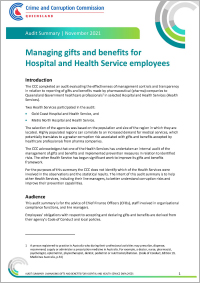 The CCC completed an audit evaluating the effectiveness of management controls and transparency in relation to reporting of gifts and benefits made by pharmaceutical companies to Queensland Government healthcare professionals in selected Hospital and Health Services.
The CCC completed an audit evaluating the effectiveness of management controls and transparency in relation to reporting of gifts and benefits made by pharmaceutical companies to Queensland Government healthcare professionals in selected Hospital and Health Services.
This audit summary is for the advice of Chief Finance Officers (CFOs), staff involved in organisational compliance functions, and line managers, to help them better understand corruption risks and improve their prevention capabilities.
The related Prevention Guide for HHS employees, which includes FAQs and a decision tree, aims to address common scenarios and dilemmas in decision-making associated with any potential offer or acceptance of a gift or benefit.
View Prevention guide - Managing gifts and benefits: a guide for Hospital and Health Service employees
View Presentation - Corruption Audit Update: Gifts and Benefits - 22 November 2021
The audit evaluated the effectiveness of agencies’ assessment of complaints about corruption.
A guide based on the findings of the audit has been developed to help agencies resolve common challenges faced when assessing complaints of corrupt conduct.
It includes the following practical materials:
- A sample step-by-step decision tree that agencies can adapt to suit their particular complaint scenarios
- “Help guides” on specific problems that the CCC’s audit identified as being challenging for assessors and decision-makers
- Case studies drawn from the audit that illustrate how a complaint is assessed against sections 15 and 38/40 of the Crime and Corruption Act 2001 (CC Act).
Download the Audit Summary - Assessing complaints of corrupt conduct - a guide for assessors and decision-makers — December 2024 (PDF)
This audit examined whether four councils in remote and Indigenous areas have effective procurement processes and practices in place to manage corruption risks. The audit identified opportunities for councils to improve their procurement frameworks to ensure their decisions are defensible in the event an allegation of corruption is made about the process or the decision. Keeping accurate records is just as important as following processes.
The information sheet provides guidance for council staff involved in managing effective procurement with probity and it includes a four-step approach for implementing control mechanisms to address corruption risks, with examples of control measures. The accompanying checklist has been developed to complement this information sheet and highlights important tasks and records to be kept.
- Download the Factsheet: Probity as a means of managing corruption risks in procurement — December 2024 (PDF)
- Download the Checklist: Probity plan checklist for procurement (PDF)
- Download the PowerPoint presentation from the webinar: Local Government Procurement Audit Findings (PPT) or view the webinar presented about the findings of the audit (YouTube).
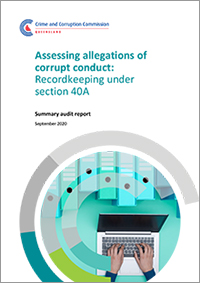 This summary audit report Assessing allegations of corrupt conduct: Recordkeeping requirements under section 40A contains the results of an audit conducted by the CCC in 2019–20. The CCC examined the policies and processes of seven public sector agencies to assess their capacity to:
This summary audit report Assessing allegations of corrupt conduct: Recordkeeping requirements under section 40A contains the results of an audit conducted by the CCC in 2019–20. The CCC examined the policies and processes of seven public sector agencies to assess their capacity to:
- effectively capture complete and accurate records of their assessment decisions of complaints about corrupt conduct coming to their attention, and
correctly form conclusions that the allegations did not reasonably raise a suspicion of corrupt conduct for the complaints to be notified to the CCC.
The following resources have been developed to complement this audit report.
- A guide to assist agencies with their recordkeeping practices relating to section 40A of the Crime and Corruption Act 2001 (CC Act). Download the Guide: Assessing allegations of corrupt conduct - A guide to recordkeeping under section 40A — December 2024 (PDF)
- A suggested template for a Corrupt Conduct Assessment form. Download the form: Corrupt Conduct Assessment form (DOC)
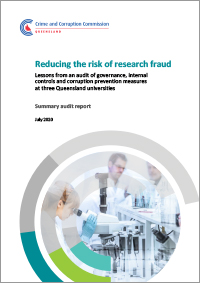 This audit was conducted to evaluate the measures that Queensland universities have put in place to mitigate research fraud. The summary of the full audit is intended to highlight the lessons to be learned from the experiences of the three participating universities, build the capacity of agencies that conduct research to deal with similar issues, and to increase transparency about the operation of the public sector.
This audit was conducted to evaluate the measures that Queensland universities have put in place to mitigate research fraud. The summary of the full audit is intended to highlight the lessons to be learned from the experiences of the three participating universities, build the capacity of agencies that conduct research to deal with similar issues, and to increase transparency about the operation of the public sector.

